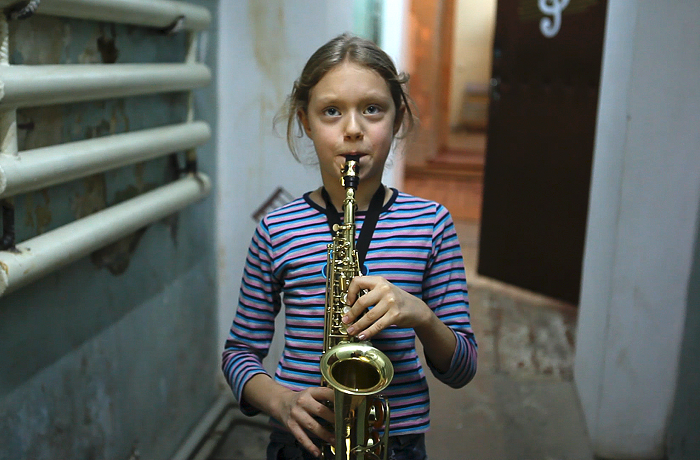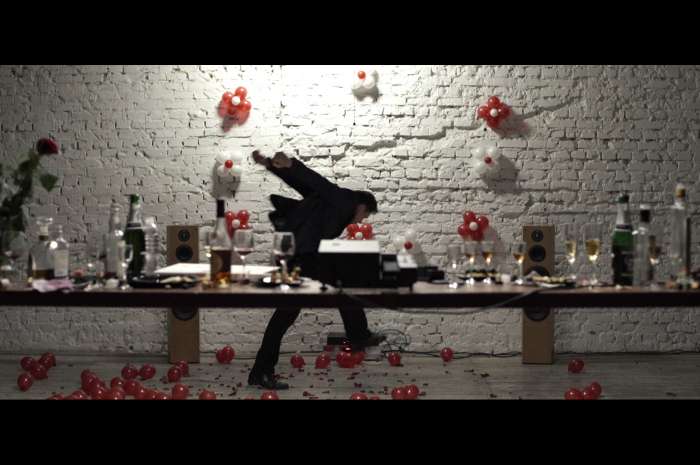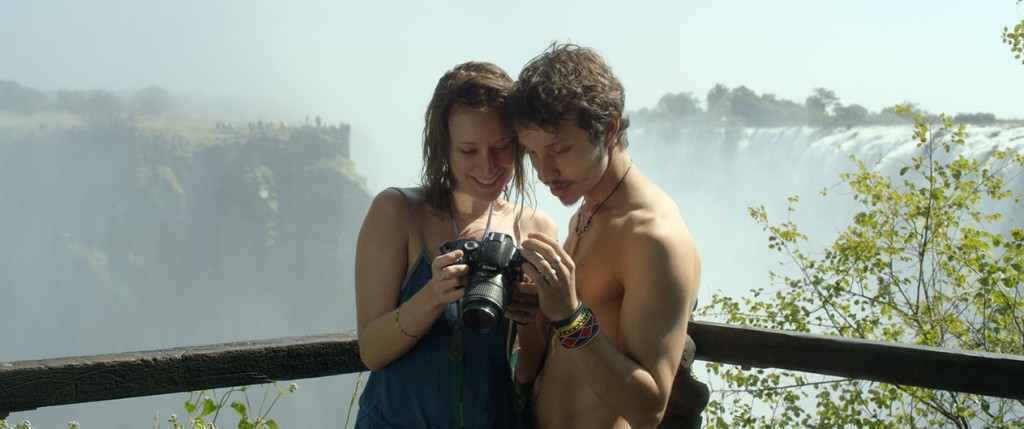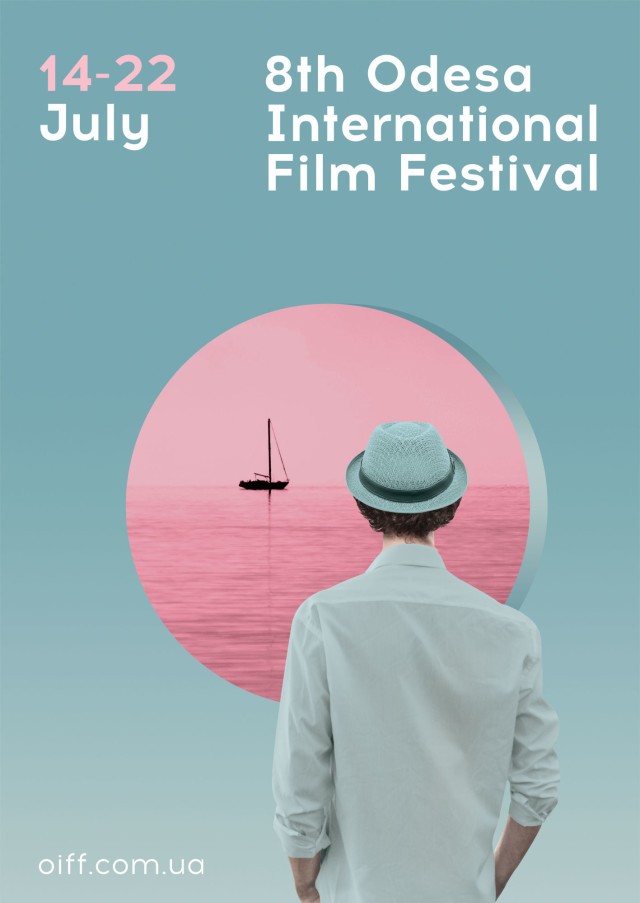Dixie Land and Black Level
By Ulyana Dovgan
The third day of the festival has demonstrated to the audiences that the future of Ukrainian cinema belongs to documentary features. The most powerful competitors of the day were presented in the National and Documentary Programs.
Dixie Land

Dixie Land directed by Roman Bondarchuk is a documentary film about a children’s orchestra from Kherson, Ukraine. This feature is one of the most notable works of OIFF’s National Competition program. Honestly, Dixie Land is the kind of powerful film that needs no introduction — it needs to be seen.
This is a personal story of one teacher and his band made up of children who have been playing from a young age. The music is their ticket to a better future. Every child has a separate destiny and personal plans, but all of them want music to be part of their lives. Sure, there are some inconveniences involved: life in a boarding school, lack of money and prospects, a daily routine of provincial life. But the children are ready to endure anything, because they have the most important thing: the love and support of their teacher.
Dixie Land is the second documentary feature by Roman Bondarchuk. His film debut Ukrainian Sheriffs won the Special Jury’s Prize in the main competition at the International Documentary Film Festival in Amsterdam (IDFA), where the film’s world premiere took place. Ukrainian Sheriffs also represented Ukraine at the Academy Awards in the Best Foreign Language Film category.
Take note — one of the leading characters, Polina, is all grown and will come to OIFF for the film presentation on Friday, July 21. As a special treat, the audiences will be able to enjoy a little performance.
Black Level

Black Level directed by Valentyn Vasyanovych is presented in both the International and National Competition Programs. The feature is having its world premiere at the Odessa International Film Festival. This picture was expected to be one of the festival favorites, but the viewers have been disappointed. We know that independent cinema in Ukraine is far from perfect, but this film takes a bold approach to eternal themes and makes interesting stylistic choices that could still win over some viewers.
The lead actors are Ukrainian film star Kateryna Molchanova and non-professional actor Konstantin Mohnach. Black Level is an exercise in improvisational technique, created without a script. Valentyn Vasyanovych is both director and cameraman here. He and his actors are the only three people who worked on the film.
The film focuses on a 50-year-old wedding photographer Kostya whose life is going nowhere. He has lost all that he loved: his paralyzed father dies; his ex-muse and mistress gets married; he has to euthanize an old pet. Just when it seems that death is approaching him through the dreary daily routine, the director gives us hope for salvation.
Important information for the animal rights people: the actor Cat really was very old, and unfortunately died while filming. Vasyanovych, being a documentary director, decided to show the true fate of the animal in his film. The hospital scene was shot with an alternate actor — another cat.
Gabriel and the Mountain
By Yevgeniya Seleznyova
It feels a bit strange to be home so early, only 8 pm, on day 3 of OIFF. The festival spirit takes you, spinning into a merry-go-round of meetings, greetings and celebrations. Very soon it becomes impossible to discuss every film with every familiar face you meet — and you’re sure to meet many, even if you’ve been to Odessa just once before. So, finally catching a taxi home in the middle of the night is much more typical of the festival circuit — but today, I decided to take a night off and stay home to recollect my festival impressions in silence (not to mention clean up a 3-day old mess…)
Gabriel and the Mountain

Today, my International Contest feature was the Brazilian-French Gabriel and the Mountain, based on a true story about the final weeks of Gabriel Buchmann, a young economist and traveler found dead in Malawi mountains back in 2009. Director Fellipe Barbosa, who was Gabriel’s classmate and friend, tries to reconstruct and investigate the path that lead to a tragedy.
At first glance, the film seems to be a mixture of “beware of Africa” and “the importance of following safety instructions”. But, as the movie progressed, I discovered a deeper layer.
Why is Gabriel’s behavior so ambivalent, ranging from extremely friendly and open, to nasty and arrogant? What makes him so stubborn, to the point of suicidal? What is he trying to prove?
In modern society, most young men don’t have the opportunity to go through a real initiation into manhood, as it was centuries ago in many societies. There’s no defined point of becoming a grown-up, and many young people become eternal teenagers without awareness of how to be responsible for their own lives. Such a state of mind brings nervousness, senselessness and emptiness.
Gabriel Buchmann represents a generation of lost millennials — overrated and overestimated. Born and raised during decades of prosperity and high hopes, he finds his life overtaken by disappointment. His Harvard application rejected, his girlfriend’s feelings unstable, his future foggy. He gets lost in the mountains, but in fact he has been lost for a while, not having a clear idea of his place in the world.
The young man makes a furious attempt to prove to himself that he is capable of winning, of conquering an actual, physical peak. He goes insane on that path, refusing any kind of help and acting hastily. As we know from the first minutes of the film, he is destined for failure.
This is a personal movie, touching on issues that everyone has faced at least once. My own feelings about the film and the protagonist are mixed and complex. Anyway, almost 12 hours after the screening I am still thinking of it. Visuals are wonderful — seeing a genuine African landscape is a pleasure in itself. Maybe a bit overextended, as if the filmmaker wanted to put it all into the story. The final grade: good, worth watching. Looking forward to the festival’s continuation tomorrow!




































